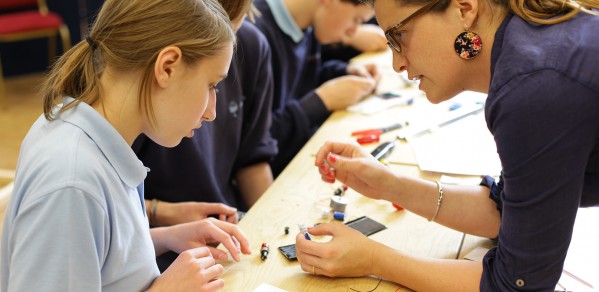
Children are often asked: ‘What do you want to be when you grow up?’ It’s a difficult question to answer. And if a child has not been exposed to a broad range of career opportunities, their choice of responses may be limited.
I wanted to support these masterclasses so that children understand that there is something truly fulfilling about designing and making things, and it is imperative that we ensure more young people and their families regard engineering as an important part of the nation’s strength.
Dr Brian Thompson
To introduce children to different aspects of engineering, the Department of Engineering is running a pilot programme, ‘Inspiring 21st Century Engineers’, whereby children in Year Nine are invited to take part in a series of four masterclasses, spaced four weeks apart.
During each session, the children are introduced to a particular aspect of engineering, before participating in a hands-on activity that brings the information to life. This is supervised by staff and students of the Department.
Mirroring other outreach programmes held by the Department, each participant is invited to bring a parent or other interested adult, who attends with them.
“There is evidence that exposure to science through parents and other close adults helps pique children’s interest in the subject,” says Maria Kettle, Outreach Officer at the Department. “Follow-up discussion motivates the students further, and the parents’ insights will add to their enthusiasm.”
Two masterclasses have already taken place, with 11 students taking part. Engineers from SDC Builders Ltd, working on campus, were eager to assist in the program, and the first two sessions had their builders and Cambridge academics and students helping the children to make their own concrete, and learning all about its properties. In the first, participants were able to mix, mould and stamp their concrete. In the second, they were able to test it and delighted to find it fit for the job.
The students also visited the site of the new Structures Laboratory, where they saw concrete in action. Partially completed floor slabs were visible, alongside the columns that will support earthquake bearings that will isolate the new strong floor from the sensitive equipment in the nearby Graphene Centre building. Perhaps, one day, some of the students will experiment in that very laboratory.
“It really is a fun way for children to be exposed to engineering,” says Maria. “The programme will encourage aspirations to study Engineering at university, and particularly in children who might not have thought of it. It’s also a great way for Cambridge students to learn about communicating their own knowledge and passion to non-experts.”
The masterclasses are currently targeted at schools in East Anglia and Norfolk. Of the 11 children taking part, three are girls. The Department hopes to increase the ratio of girls to boys in future programmes, and to broaden the number of schools taking part.
The programme is enabled by the generous support of Cambridge alumnus, Dr Brian Thompson (Peterhouse 1956), who is eager to ensure that children from diverse backgrounds are inspired by the fascinating world of engineering.
“My own career in engineering was extremely satisfying,” says Brian. “I wanted to support these masterclasses so that children understand that there is something truly fulfilling about designing and making things, and it is imperative that we ensure more young people and their families regard engineering as an important part of the nation’s strength. I’m particularly motivated to encourage more children from less advantaged backgrounds to have the opportunity to access the same kind of technical education that I did.”
www.eng.cam.ac.uk/events-and-outreach
www.philanthropy.cam.ac.uk

